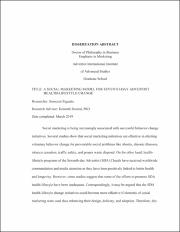| dc.description.abstract | Social marketing is being increasingly associated with successful behavior change initiatives. Several studies show that social marketing initiatives are effective in eliciting voluntary behavior change for preventable social problems like obesity, chronic illnesses, tobacco cessation, traffic safety, and proper waste disposal. On the other hand, health-lifestyle programs of the Seventh-day Adventist (SDA) Church have received worldwide commendation and media attention as they have been positively linked to better health and longevity. However, some studies suggest that some of the efforts to promote SDA health-lifestyle have been inadequate. Correspondingly, it may be argued that the SDA health-lifestyle change initiatives could become more effective if elements of social marketing were used thus enhancing their design, delivery, and adoption. Therefore, this
study used appreciative inquiry as well as grounded theory to build a theory and a social marketing model for SDA health-lifestyle change initiatives.
The major findings are the following: (a) Worldview, program benchmarks, program plans, and strategic thrust are the main themes that characterize the SDA health-lifestyle programs. (b) The grounded theory emerging from this study is that health-lifestyle behavior modification is driven by centers of influence that run benchmarked programs shaped by distinctively Adventist worldview, and guided via a compelling vision and social marketing design criteria. (c) The formal grounded theory from this study is that health-lifestyle behavior modification is driven by the strategic thrust adopted, shaped by the worldview embraced, fashioned by program benchmarks subscribed, and directed by the program plan implemented. (d) The emergent social marketing model suggests that social marketing design criteria used, together with SDA health-lifestyle programs is more likely to result in health-lifestyle change. The implications of the emergent theory are that current and future SDA health-lifestyle programs should (a) be aligned to reflect the themes and lessons in the grounded theory, (b) adopt the suggested social marketing design criteria, (c) adopt or adapt the suggested implementation framework. Likewise, the suggested theory and model provide a platform for academic discourse on social marketing and health-lifestyle initiatives. | en_US |

